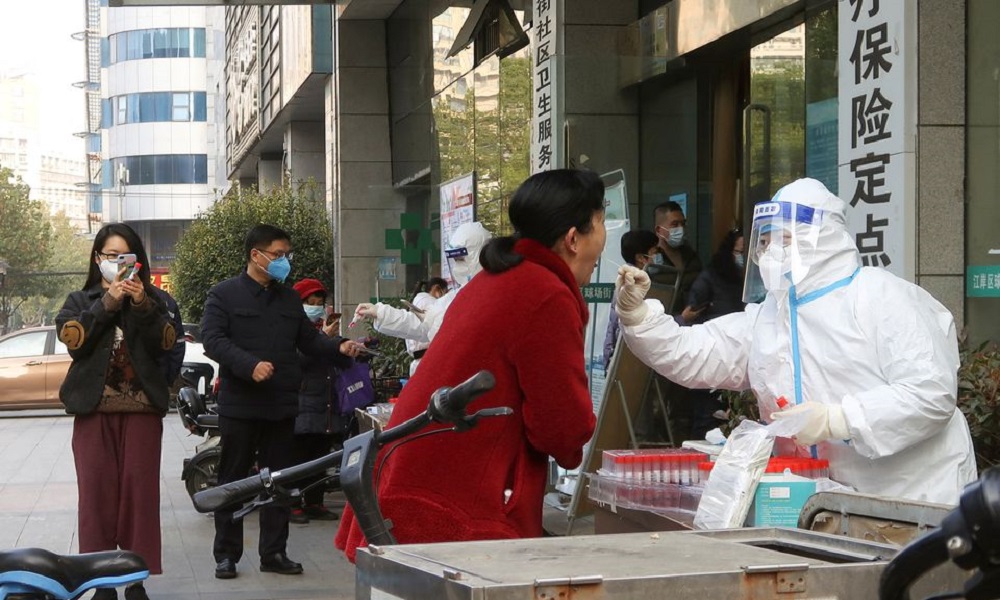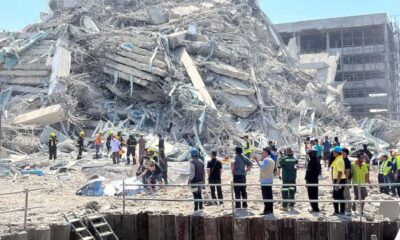COVID-19
China’s Xi calls for oil trade in yuan at Gulf summit in Riyadh

President Xi Jinping told Gulf Arab leaders on Friday that China would work to buy oil and gas in yuan, a move that would support Beijing’s goal to establish its currency internationally and weaken the US dollar’s grip on world trade.
Xi was speaking in Saudi Arabia where Crown Prince Mohammed bin Salman hosted two “milestone” Arab summits with the Chinese leader which showcased the powerful prince’s regional heft as he courts partnerships beyond close historic ties with the West, Reuters reported.
Top oil exporter Saudi Arabia and economic giant China both sent strong messages during Xi’s visit on “non-interference” at a time when Riyadh’s relationship with Washington has been tested over human rights, energy policy and Russia.
Any move by Saudi Arabia to ditch the dollar in its oil trade would be a seismic political move, which Riyadh had previously threatened in the face of possible US legislation exposing OPEC members to antitrust lawsuits.
China’s growing influence in the Gulf has unnerved the United States. Deepening economic ties were touted during Xi’s visit, where he was greeted with pomp and ceremony and on Friday met with Gulf states and attended a wider summit with leaders of Arab League countries spanning the Gulf, Levant and Africa.
At the start of Friday’s talks, Prince Mohammed heralded a “historic new phase of relations with China”, a sharp contrast with the awkward US-Saudi meetings five months ago when President Joe Biden attended a smaller Arab summit in Riyadh.
Asked about his country’s relations with Washington in light of the warmth shown to Xi, Foreign Minister Prince Faisal bin Farhan Al Saud said Saudi Arabia would continue to work with all its partners. “We don’t see this as a zero sum game,” he said.
“We do not believe in polarization or in choosing between sides,” the prince told a news conference after the talks.
Though Saudi Arabia and China signed several strategic and economic partnership deals, analysts said relations would remain anchored mostly by energy interests, though Chinese firms have made forays into technology and infrastructure sectors.
“Energy concerns will remain front and centre of relations,” Robert Mogielnicki, senior resident scholar at the Arab Gulf States Institute in Washington, said.
“The Chinese and Saudi governments will also be looking to support their national champions and other private sector actors to move forward with trade and investment deals. There will be more cooperation on the tech side of things too, prompting familiar concerns from Washington.”
COVID-19
WHO declares end to COVID global health emergency

The World Health Organization said Friday that COVID-19 no longer qualifies as a global emergency, marking a symbolic end to the devastating coronavirus pandemic that triggered once-unthinkable lockdowns, upended economies and killed millions of people worldwide.
The announcement, made more than three years after WHO declared the coronavirus an international crisis, offers some relief, if not an ending, to a pandemic that stirred fear and suspicion, hand-wringing and finger-pointing across the globe, AP reported.
The U.N. health agency’s officials said that even though the emergency phase was over, the pandemic hasn’t finished, noting recent spikes in cases in Southeast Asia and the Middle East.
WHO says thousands of people are still dying from the virus every week, and millions of others are suffering from debilitating, long-term effects.
“It’s with great hope that I declare COVID-19 over as a global health emergency,” WHO Director-General Tedros Adhanom Ghebreyesus said.
“That does not mean COVID-19 is over as a global health threat,” he said, warning that new variants could yet emerge. Tedros noted that while the official COVID-19 death toll was 7 million, the real figure was estimated to be at least 20 million.
Tedros said the pandemic had been on a downward trend for more than a year, acknowledging that most countries have already returned to life before COVID-19.
He bemoaned the damage that COVID-19 had done to the global community, saying the pandemic had shattered businesses, exacerbated political divisions, led to the spread of misinformation and plunged millions into poverty.
When the U.N. health agency first declared the coronavirus to be an international crisis on Jan. 30, 2020, it hadn’t yet been named COVID-19 and there were no major outbreaks beyond China.
More than three years later, the virus has caused an estimated 764 million cases globally and about 5 billion people have received at least one dose of vaccine.
In the U.S., the public health emergency declaration made regarding COVID-19 is set to expire on May 11, when wide-ranging measures to support the pandemic response, including vaccine mandates, will end. Many other countries, including Germany, France and Britain, dropped most of their provisions against the pandemic last year.
When Tedros declared COVID-19 to be an emergency in 2020, he said his greatest fear was the virus’ potential to spread in countries with weak health systems.
Most recently, WHO has struggled to investigate the origins of the coronavirus, a challenging scientific endeavor that has also become politically fraught.
COVID-19
COVID-19 in Iran: Nearly 900 new cases, 24 deaths recorded

The Iranian health ministry announced on Sunday that more than 890 new cases of COVID-19 have been identified across the country during the past 24 hours, adding that 24 patients have died in the same period of time, Fars News Agency reported.
“A sum of 891 new patients infected with COVID-19 have been identified in the country based on confirmed diagnosis criteria during the past 24 hours,” the Iranian Health Ministry’s Public Relations Center said on Sunday, adding, “454 patients have been hospitalized during the same time span.”
The ministry’s public relations center said 611 people infected with COVID-19 are in critical condition.
COVID-19
China says 200 million treated, pandemic ‘decisively’ beaten

China says more than 200 million of its citizens have been diagnosed and treated for COVID-19 since it lifted strict containment measures beginning in November.
With 800,000 of the most critically ill patients having recovered, China has “decisively beaten” the pandemic, according to notes from a meeting of the ruling Communist Party’s all-powerful Politburo Standing Committee presided over by President and party leader Xi Jinping, AP reported.
China enforced some of the world’s most draconian lockdowns, quarantines and travel restrictions and still faces questions about the origins of the virus that was first detected in the central Chinese city of Wuhan in late 2019. Heavy-handed enforcement prompted rare anti-government protests and took a heavy toll on the world’s second-largest economy.
The official Xinhua News Agency quoted Xi as saying that policies to control the outbreak had been “entirely correct.” The abrupt lifting in November and December of the “zero COVID” policy that had sought to eliminate all cases of the virus led to a surge in infections that temporarily overwhelmed hospitals.
Case numbers have since peaked and life has largely returned to normal, although international travel in and out of China has yet to return to pre-pandemic levels.
China is now transitioning to a post-pandemic stage after a fight against the outbreak that was “extraordinary in the extreme,” Xinhua said.
The government will continue to “optimize and adjust prevention and control policies and measures according to the times and situations with a strong historical responsibility and strong strategic determination,” Xinhua said.
-

 Business5 days ago
Business5 days ago36 mining contracts inked over the past year: Mines ministry
-

 Latest News5 days ago
Latest News5 days agoDried fruit market in Herat booms ahead of Eid-al-Fitr
-

 Regional5 days ago
Regional5 days agoPowerful quake in Southeast Asia kills several, Myanmar declares state of emergency
-

 Latest News5 days ago
Latest News5 days agoUS may ask for military equipment left behind in Afghanistan: Trump
-

 International Sports5 days ago
International Sports5 days agoLucknow’s six-hitting machine Pooran justifies top order slot
-

 Latest News4 days ago
Latest News4 days agoMore than 70,000 Afghans returned home in third week of March: IOM
-

 Health4 days ago
Health4 days agoGlobal organizations warn of health crisis due to aid cuts in Afghanistan
-

 International Sports4 days ago
International Sports4 days agoChennai grapple with IPL home truth after Bengaluru defeat
























